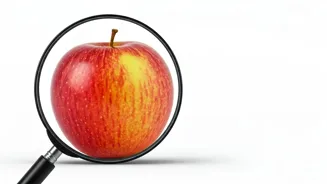Myth 1: Detoxification is real
One of the most pervasive myths is the idea of 'detox' diets. Many believe that consuming specific foods or beverages can cleanse the body of toxins. However,
experts clarify that our bodies already have built-in detoxification systems, primarily the liver and kidneys, which are very efficient. These organs are designed to eliminate waste and toxins naturally. While eating healthy foods and staying hydrated supports these systems, there's no scientific evidence to support the effectiveness of commercial detox products or specialized diets. These often involve restrictive eating plans, which can lead to nutrient deficiencies and, in some cases, potential health risks. The focus should be on supporting the body's natural functions through a balanced diet and healthy lifestyle choices.
Myth 2: Carbs are bad
Carbohydrates have unfairly gained a bad reputation, often vilified as enemies of weight loss and health. The reality is more nuanced. Carbs come in various forms, including simple sugars and complex carbohydrates. Simple sugars, found in processed foods and sugary drinks, should be limited. However, complex carbohydrates, present in whole grains, fruits, and vegetables, are vital. They provide fiber, vitamins, and minerals, and they are the body's primary energy source. Cutting out carbs entirely can lead to a lack of essential nutrients. A balanced diet includes a variety of carbohydrate sources, emphasizing whole, unprocessed options. The key is to choose the right carbs, which fuel your body in a healthy and sustainable way.
Myth 3: Gluten intolerance
The notion of widespread gluten intolerance has become quite popular. While celiac disease, a severe autoimmune reaction to gluten, is a real condition, many people self-diagnose gluten sensitivity. However, symptoms like bloating, fatigue, and digestive issues can often be attributed to other factors. For those with celiac disease, a gluten-free diet is essential. Yet, for the majority, avoiding gluten may not be necessary or beneficial. If you suspect a gluten sensitivity, the recommendation is to consult a healthcare professional for proper diagnosis. Eliminating gluten unnecessarily can lead to a less varied diet and potentially miss out on important nutrients from gluten-containing foods like whole grains.
Myth 4: All calories are equal
The idea that all calories are created equal simplifies nutrition. The source of calories makes a big difference. While it's true that a calorie is a calorie in terms of energy, the impact on your body depends on the food it comes from. For example, 100 calories from a sugary soda won't offer the same nutritional value or fullness as 100 calories from a handful of almonds. Foods rich in protein, fiber, and healthy fats promote satiety and support overall health, while processed foods with empty calories provide little nutritional value and may lead to overeating. Focusing on nutrient-dense foods is key, emphasizing quality over quantity when it comes to calorie intake.
Myth 5: Supplements fix deficiencies
While supplements can play a role, many believe they can entirely compensate for a poor diet. The reality is that supplements are meant to 'supplement,' not replace, a healthy eating plan. Whole foods offer a variety of nutrients, including vitamins, minerals, and fiber, which work synergistically. Supplements often contain isolated nutrients and may not be as effective as natural sources. For example, iron from spinach is absorbed and utilized differently compared to an iron supplement. Supplements can be beneficial for those with specific deficiencies or health conditions, but it's essential to get your nutrients primarily from your diet. Prioritizing a balanced diet ensures a wide range of essential nutrients.
Myth 6: Low-fat equals healthy
The low-fat craze of the past has led to a lingering myth that low-fat foods are automatically healthier. Food manufacturers replaced fat with sugar and other additives to maintain taste, which may have ultimately increased calorie consumption. Healthy fats, like those found in avocados, nuts, and olive oil, are crucial for various bodily functions. They support brain health, hormone production, and nutrient absorption. Eliminating fats can lead to nutrient deficiencies and leave you feeling less satisfied after meals. The focus should be on choosing the right fats, such as unsaturated fats and limiting saturated and trans fats found in processed foods.
Myth 7: Exercise trumps diet
While exercise is undeniably essential for overall health and fitness, some believe it can override poor dietary choices. In terms of weight loss, nutrition typically plays a much larger role. You can't outrun a bad diet. Even with intense exercise, consuming excessive calories from unhealthy foods will counteract your efforts. Exercise burns calories, boosts metabolism, and provides numerous health benefits. Diet, however, determines the quality and quantity of those calories. A combination of a balanced diet and regular exercise is ideal. Focusing on mindful eating alongside a consistent workout routine will give you the best results for weight management and overall well-being.
Myth 8: Eating after 8 pm
Many people wrongly believe that eating after a certain time, such as 8 p.m., automatically leads to weight gain. The timing of your meals is less critical than the overall calorie intake and the quality of the food. Your body burns calories throughout the day, regardless of when you eat. However, nighttime eating can become a problem if it leads to overeating or consuming unhealthy snacks. If you're prone to late-night snacking, focus on healthy, low-calorie options like fruits or vegetables. The key is to be mindful of your total daily intake. The real culprits behind weight gain are excess calories, regardless of when they are consumed. Prioritizing healthy choices and controlling portion sizes remains the most effective approach.
Myth 9: Juicing is healthy
Juicing has been touted as a quick way to obtain nutrients and detoxify the body. While juicing provides vitamins and minerals, it often lacks fiber, which is essential for digestive health and regulating blood sugar levels. The process of juicing removes the fiber-rich pulp, leaving mostly sugar. The concentrated sugars in juice can cause spikes in blood sugar and may not promote satiety. A better alternative is to blend fruits and vegetables so that you retain the fiber. Consuming whole fruits and vegetables ensures you benefit from their fiber content, alongside vitamins and minerals. If you choose to juice, do so sparingly and incorporate it as part of a balanced diet rather than a primary method.
Myth 10: Artificial sweeteners are safe
Artificial sweeteners are often marketed as a healthy alternative to sugar, with fewer calories. However, there is debate about their long-term effects. While some studies show that artificial sweeteners can aid in weight loss, other research suggests they might disrupt gut health or lead to increased sugar cravings. The concern is that these sweeteners, which are often many times sweeter than sugar, may also lead people to consume more sugar in the long run. Moderate consumption of artificial sweeteners is generally considered safe, though it's wise to be aware of the potential risks. The best approach is to consume these sweeteners sparingly and focus on reducing your reliance on overly sweet foods and drinks.





















